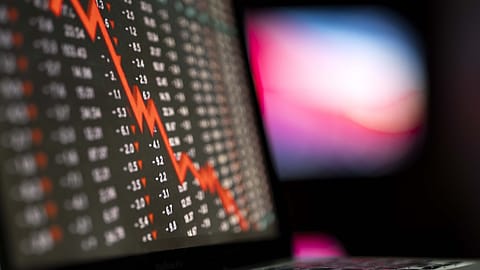Deep trouble for Sensex, Nifty as GIFT Nifty crashes 900 pts, Asian markets plunge 10%
The GIFT Nifty index nosedived 900 points, or 3.6%, to 22,130, indicating a sharp sell-off in Sensex and Nifty in opening trade.

Indian share markets are set to open sharply lower on Monday as Asian stocks and Wall Street futures saw record selling amid concerns over the impact of U.S. reciprocal tariffs and potential announcements of further sector-specific tariffs during the week. The GIFT Nifty index crashed as much as 900 points, or 3.6%, to 22,130, indicating a sharp sell-off in opening deals for the domestic benchmarks BSE Sensex and NSE Nifty.
The continued free-fall in global equity markets amid heightened geopolitical tensions after aggressive tariffs by the U.S. administration is set to inject volatility in the domestic market. Share markets in Asia-Pacific region tumbled as much as 10% in opening trade, tracking negative closing in Wall Street on Friday.
Last week, both equity benchmarks BSE Sensex and NSE Nifty dropped 2.5% each, amid sharp sell-off in IT and pharma stocks. The Nifty settled the week at 22,904.40, while the Sensex closed near the week’s low at 75,364.69.
Asian markets dive 10% on trade war concerns
Extending last week’s fall, Asian shares struggled to shake off pessimism after stock market rout in Wall Street last Friday. The equity markets in Asia-Pacific region crashed up to 10% in early trade, led by Japan, Hong Kong, and South Korea. Japan’s Nikkei index tumbled 7%, while South Korea’s KOSPI plummeted 5%. On the other hand, Hong Kong’s Hang Sang and Taiwan’s Weighted stock index nosedived up to 10%. Singapore’s Straits Times fell 7%, while China’s Shanghai Composite was trading down by 5.5%. Meanwhile, Australia’s ASX 200 index closed 4% lower.
The sharp correction in Asian market was fuelled by a massive sell-off in Wall Street last Friday, with the U.S. indices recording one of the biggest market erosion in history. The U.S. market wiped out a combined $6.6 trillion in value on just two days – Thursday and Friday, while it lost over $11 trillion in market capitalisation since January 17, before President Donald Trump took the oath of office and began his second term.
On Friday, the Dow Jones Industrial Average crashed 5.5% after losing 4% in the previous session, while the S&P 500 plunged 5.97%, adding to its Thursday’s fall of 4.84%. In a similar trend, the Nasdaq Composite closed 5.73% lower, extending previous session drop of 5.97%. There is fear in the market that a dramatic escalation of a trade war could drag the U.S. and global economies into a recession.
Recommended Stories
The sentiment was further dented after the Federal Reserve Chairman Jerome Powell expressed concern that President Trump's tariffs are likely to cause both increased inflation and a slowdown in economic growth. He also signaled that the Fed would delay any interest rate changes until the full economic consequences of the tariffs become clearer.
(DISCLAIMER: The views and opinions expressed by investment experts on fortuneindia.com are either their own or of their organisations, but not necessarily that of fortuneindia.com and its editorial team. Readers are advised to consult certified experts before taking investment decisions.)